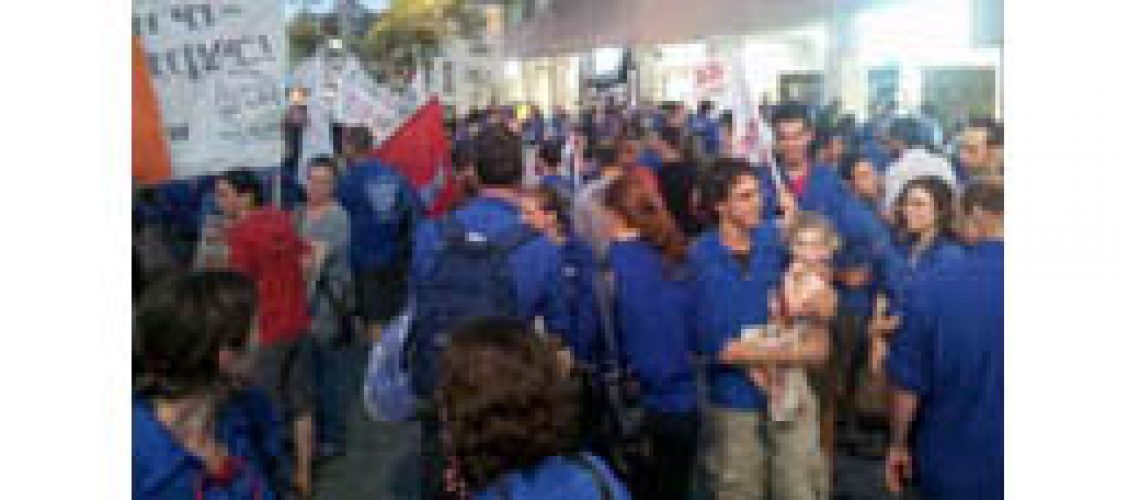Tonight I marched for social justice beside olim from Habonim Dror North America and members of the Dror Israel movement.
I was planning to go to a Pink Floyd cover concert in Akko. The concert was postponed and Dror Israel spearheaded efforts to arrange a rally on short notice in response to violent clashes between protesters and police last week. “העם דורש צדק חברתי”–the nation demands social justice. But violence will not be on the path to social justice.
We met at Kikar Habimah. Rallies like this always feel a bit like a social event. I love to see my friends from Tel Aviv and Haifa, but I’ve seen them pretty frequently in the past month. Its a special treat to see the chevrei t’nua scattered across Hadera, the more distant Tel Aviv suburbs and the Galil. This, of course, is not the point, but it’s a nice bonus. So is seeing a toddler in a stroller clutching a sign that says “כשהממשלה נגד העם, העם נגד הממשלה”–because the government opposes the people, the people oppose the government.
We walked east on Marmorek. Israeli protesters inventing chants have a much easier task than their American counterparts. Everything rhymes in Hebrew. To some extent, the bar is set slightly higher for the creativity and coherence of Hebrew slogans. One popular chant converted from a soccer cheer begins with a wordless melody and ends with “במקום לעניים, נותנים לעשירים, איזה ממשלה של מושחתים” — rather than giving to the poor, they give to the rich, what a corrupt government.
We headed north on Ibn Gvirol. There was a lot of energy. Most of the time there were a few chants within earshot. Once in a while the crowd began hooting and cheering for no apparent reason. It was hot, but not too terrible by Tel Aviv summer standards. I forgot my water bottle. Most movement members were well prepared with water bottles, and they happily shared with me. You might say they were my safety net. “או אה מי זה בה, מדינת הרווחה”–ooh, aah, who’s that coming, it’s the welfare state.
We marched east on Shaul Hamelech. I didn’t know how to judge the numbers, but it felt like a lot of people. Thousands. I tried to reason it out–I knew about 50 people, and I couldn’t possibly know more than one in a hundred, so that makes…5,000? That seems a bit low, actually. I hoisted an Australian oleh on my shoulders so he could get a better idea of the attendance. “Count how many people you see,” I told him. He only made it to twenty before a movement sadran instructed me to put my friend down, for safety’s sake. I could have counted twenty from ground level, and it is way too low. After all, “כל העם אופוזיציה”–the entire nation is in the opposition.
We arrived at the square in front of the Tel Aviv Museum. Enterprising bagel and water salesmen hawked their wares. I drifted among the Dror Israel crowd, where a handful of chevrei tnua simultaneously translated the speeches into English. Yossi Yona, a social-protest affiliated economist, led off the speakers. The father of a police officer who died in the Carmel fires spoke next. Rona Kenan sang Sachki Sachki. A social worker discussed the importance of unionization and the failures of the Histadrut. Some guy whose name I did not catch enumerated the ways in which the current government, as opposed to the social protesters, is violent. Three young girls from blue shirt movements explained how the ideals they learn in school do not correspond to reality.
The father of the police officer made the biggest impression on me. He has been silent for more than a year, he said, waiting for the inspector general’s report to come out. Government ministers pass the buck, each one blaming another, but the public must demand accountability. This and other inspector general reports are being ignored, buried, tossed in the dustbin of history. This man is planning to go to the supreme court against the prime minister, finance minister, and interior minister, because he thinks that everyone who was in charge during the botched handling of the Carmel fires ought to be fired.
Most of the chants I heard tonight were repeats from earlier protests, but I think one was new: “זו לא טעות, זו מדיניות”–it is not a mistake, it is policy. The theme I took away from this and the protest overall was responsibility. The protesters are responsible for behavior at protests and must avoid violence. The government must be held responsible for its policies and their consequences.


